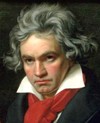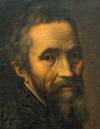Beethoven, according to biographer Maynard Solomon’s Beethoven:

“Wegeler tells us that when a series of lectures on Kant was organized in Vienna in the 1790s, ‘Beethoven didn’t want to attend even once, even under my urging.’ Rather, Beethoven preferred self-education through voracious reading in popularizations of the works of the major thinkers; through rich encounters with poetry, drama, and opera; and, most happily, through discourse and conversation with good minds in pleasant surroundings—whether in the salon or the tavern, the palace or the coffeehouse.” (pp. 36-37)
And: “In 1809 [Beethoven] wrote to the Leipzig music publisher Breitkopf & Hä̈rtel: ‘There is hardly any treatise which could be too learned for me. I have not the slightest pretension to what is properly called erudition. Yet from my childhood I have striven to understand what the better and wiser people of every age were driving at in their works.’” (p. 37)
That intense engagement with the great works of the great minds reminds me of Michelangelo’s early and ongoing education. When Michelangelo was a teen, according to biographer William Wallace, he was exposed to the best of the Florentine intellectual ferment:

“To begin with, the young boy was taken into the famiglia by Lorenzo the Magnificent, who treated him like a son. He spent two of the happiest years of his life in the Medici Palace, surrounded by the members of Lorenzo’s humanist circle and alongside his future patrons, Giovanni and Giulio de’ Medici (respectively popes Leo X and Clement VII).” (The Genius of the Sculptor in Michelangelo’s Work, p. 152)
That engagement with discussion, reading, and thinking, remained a lifelong passion. From James Hall’s Michelangelo and the Reinvention of the Human Body:
“Michelangelo venerated Dante throughout his life, and addressed two of his own poems to him. When he stayed in Bologna for about a year after the fall of the Medici in 1494, he is said to have read every evening to his patron Giovan Francesco Aldovrandi passages from Dante, Petrarch and Boccaccio – only stopping when his employer fell asleep.” (p. 21)
Related:
Artist Michael Newberry’s brief commentaries on great works in art history.
Architect John Gillis’s brief commentaries on great works in art history.
Philosopher Stephen Hicks’s How Art Became Ugly lecture at ESEADE University, Buenos Aires: